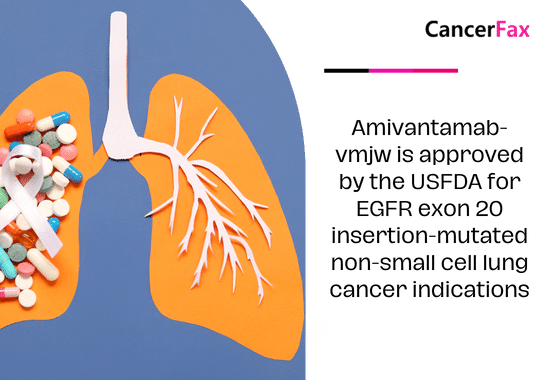Amivantamab-vmjw is approved by the USFDA for EGFR exon 20 insertion-mutated non-small cell lung cancer indications
The Food and Drug Administration approved amivantamab-vmjw (Rybrevant, Janssen Biotech, Inc.) in combination with carboplatin and pemetrexed on March 1, 2024. Patients with epidermal growth factor receptor (EGFR) exon 20 insertion mutations, identified by an FDA-approved test, are eligible for this treatment as the initial therapy for locally advanced or metastatic non-small cell lung cancer (NSCLC).
It was approved by the FDA to be used on adult patients with locally advanced or metastatic NSCLC who had EGFR exon 20 insertion mutations, which could be confirmed by an FDA-approved test, and whose condition got worse after platinum-based treatment. The FDA has already given rapid approval for this purpose.
The PAPILLON trial (NCT04538664) looked at how well it worked. It was a randomized, open-label, multicenter study with 308 patients who had EGFR exon 20 insertion mutations. Patients were randomly assigned in a 1:1 ratio to receive either amivantamab-vmjw with carboplatin and pemetrexed or carboplatin and pemetrexed.
The primary measure of effectiveness was progression-free survival (PFS) evaluated by blinded independent central review (BICR), with overall survival (OS) as an important secondary endpoint. A hazard ratio of 0.40 (95% CI: 0.30–0.53; p-value<0.0001) showed that amivantamab-vmjw plus carboplatin and pemetrexed significantly improved progression-free survival compared to carboplatin and pemetrexed alone. The median progression-free survival (PFS) was 11.4 months with a 95% confidence interval (CI) of 9.8 to 13.7 in one arm, and 6.7 months with a 95% CI of 5.6 to 7.3 in the other arm.
Although the overall survival statistics were not fully developed at the current analysis, with just 44% of the pre-specified fatalities reported for the final analysis, there was no indication of a negative trend.
The predominant side effects (≥20%) included rash, nail toxicity, stomatitis, infusion-related response, fatigue, edema, constipation, decreased appetite, nausea, COVID-19, diarrhea, and vomiting.
The patient’s body weight determines the recommended dosage of amivantamab-vmjw. Refer to the prescription instructions for precise dosage details.
Susan Hau is a distinguished researcher in the field of cancer cell therapy, with a particular focus on T cell-based approaches and cancer vaccines. Her work spans several innovative treatment modalities, including CAR T-cell therapy, TIL (Tumor-Infiltrating Lymphocyte) therapy, and NK (Natural Killer) cell therapy.
Hau's expertise lies in cancer cell biology, where she has made significant contributions to understanding the complex interactions between immune cells and tumors.
Her research aims to enhance the efficacy of immunotherapies by manipulating the tumor microenvironment and exploring novel ways to activate and direct immune responses against cancer cells.
Throughout her career, Hau has collaborated with leading professors and researchers in the field of cancer treatment, both in the United States and China.
These international experiences have broadened her perspective and contributed to her innovative approach to cancer therapy development.
Hau's work is particularly focused on addressing the challenges of treating advanced and metastatic cancers. She has been involved in clinical trials evaluating the safety and efficacy of various immunotherapy approaches, including the promising Gamma Delta T cell therapy.
- Comments Closed
- March 5th, 2024






Amivantamab-vmjw approval, Bispecific antibody treatment, EGFR exon 20 insertion, FDA-approved NSCLC drugs 2024, Precision oncology breakthroughs, Rare EGFR mutation drugs, Rybrevant for NSCLC, Targeted lung cancer therapy
CancerFax is the most trusted online platform dedicated to connecting individuals facing advanced-stage cancer with groundbreaking cell therapies.
Send your medical reports and get a free analysis.
🌟 Join us in the fight against cancer! 🌟
Привет,
CancerFax — это самая надежная онлайн-платформа, призванная предоставить людям, столкнувшимся с раком на поздних стадиях, доступ к революционным клеточным методам лечения.
Отправьте свои медицинские заключения и получите бесплатный анализ.
🌟 Присоединяйтесь к нам в борьбе с раком! 🌟